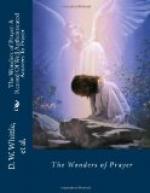So in the very constitution of man’s being there is the highest reasonableness in prayer. And, if the position of man in his relation to the earth he inhabits is recognized and understood, there is no unreasonableness in a God-fearing man looking to God for help and deliverance under any and all circumstances, in all the vicissitudes of life. The earth was made for man. One has said “there is nothing great in the world but man; and there is nothing great in man but his soul.” With this in view, how absurd to talk about “fixed laws” and “unchangeable order,” in a way to keep man in his trouble from God. It is all the twaddle of the conceit of man setting himself up to judge and limit his maker. “To whom then will ye liken Me, or shall I be equal? saith the Holy One.” The Creator is greater than his creation; the law giver is supreme over all law. He created the earth that it might be inhabited by man, and He governs the earth in subordination to the interests, the eternal and spiritual welfare of the race of immortal beings that are here being prepared for glory and immortality.
Laws, indeed, are fixed in their operation and results as subserving the highest good in the training and the disciplining of the race, giving them hope in their labor and sure expectation of fruit from their toil. But as set in operation for man’s good, so, in an exigency that may make necessary their suspension, to secure his deliverance from peril and bring man back to the recognition of the personal God, as above, law, is it unreasonable to believe that God has power thus to suspend or overrule his own arrangements? A wise father will govern his children by rules as securing their best good. But he will retain in his power the suspending of those rules when special occasions arise, when the object for which they exist can be better secured by their suspension. Shall not the living God have the same right?
So much as to the reflections suggested by the dogmas of natural religion. They sustain in reason our faith in prayer. The basis, however, of our faith rests upon the unchanging and unchangeable revelation of God, and not upon man’s philosophy. Jesus taught his disciples to pray, saying, “Our Father which art in Heaven.” As Christians, this is our authority for prayer. In the words, “OUR FATHER,” our Blessed Lord has given us the substance of all that can be said, as to the privilege of prayer, what to pray for, and how to pray. There can be no loftier exercise of soul ever given to created intelligence than to come into conscious contact with the living God, and be able to say “My Father.”
And surely, as my Father, with a loving father’s heart, it must be his desire that I should tell him all my needs, all my sorrows, all my desires. And, so his word commands, “Be careful for nothing, but in everything, by prayer and supplication, with thanksgiving, let your requests be made known unto God.” (Phil, iv., 6.) Under this verse there is positively no exception of any request that may not be made known unto God. So there is true faith and right Christian philosophy in the remark, “if a pin was needful to my happiness and I could not find one I would pray to God for it.”




